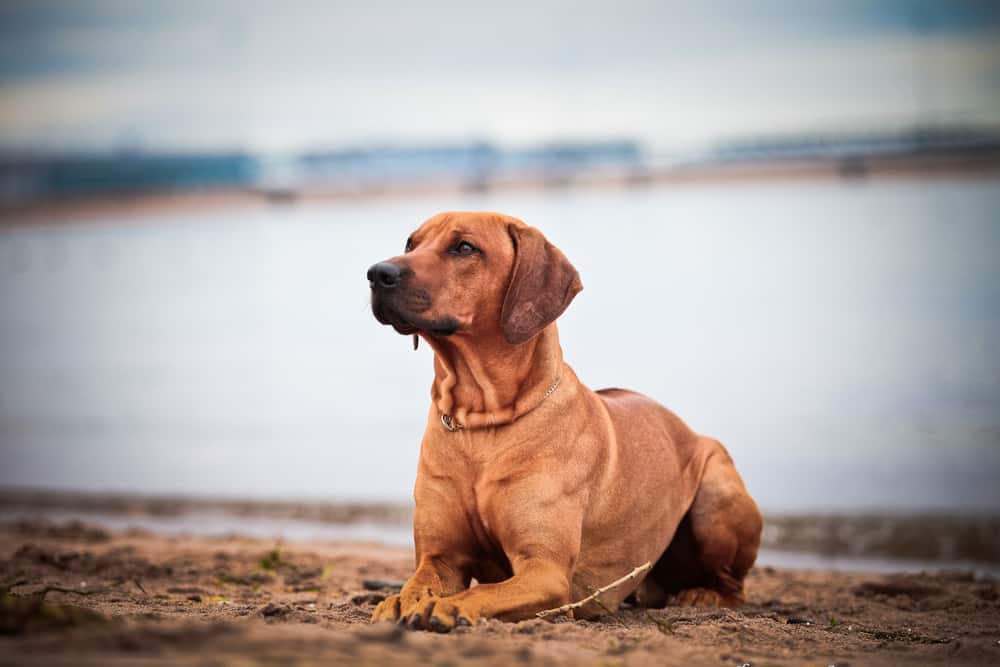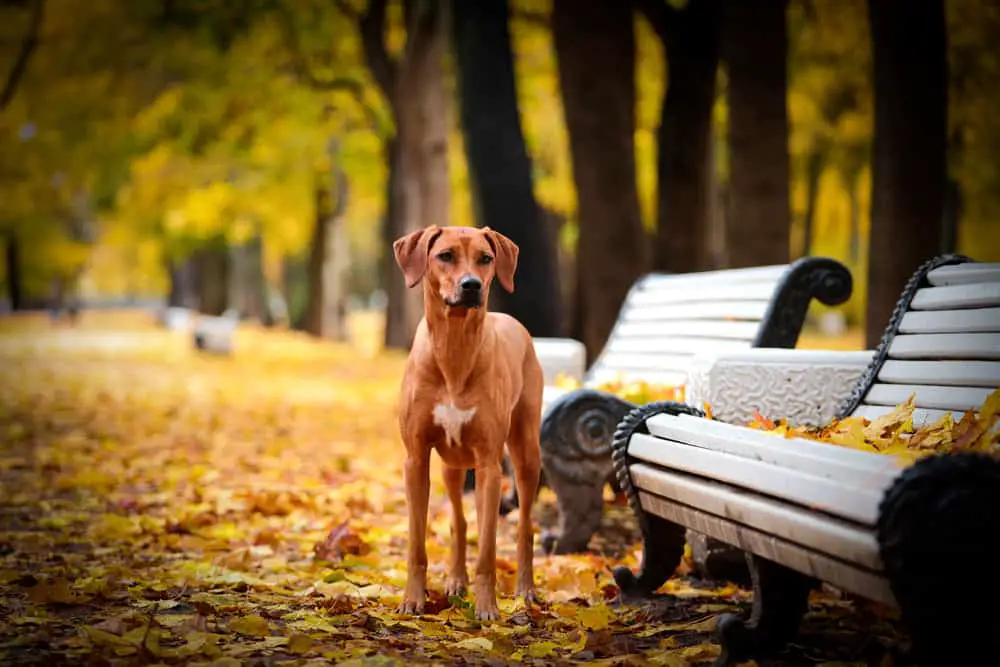Complete Guide To The Rhodesian Ridgeback: Care, Feeding, Personality and More
The Rhodesian Ridgeback is an easily identifiable dog with a ridge of hair outlining his back. Technically belonging to the Hound group, this dog was originally bred to hunt big game in Africa, including lions. Strong, athletic, and loyal to his family, the Rhodesian Ridgeback is a quiet and reserved dog willing to protect his family if the need arises. Although this is a powerful dog not well suited for a novice dog owner, the Rhodesian Ridgeback can be the perfect family member for the right family willing to dedicate the necessary time and training.
I’m a veterinarian with 20 years experience at a small animal practice in Colorado. I’ve seen many, many Rhodesian Ridgebacks (Rhodies are what we call them) and can confidently inform you as to what to expect from one. What I find interesting is that Rhodesian Ridgeback owners are very loyal to their breed. They’re more likely to have multiple Rhodies rather than mix one into a group of other dogs.

Table of Contents
How Big Do Rhodesian Ridgebacks Get?
This dog is large and athletic, with a muscular and thin cut. Males are typically larger than females when it comes to the Rhodesian Ridgeback. A male will measure about 25 to 27 inches to the shoulder and usually weigh about 85 pounds. Females will measure about 24 to 26 inches to the shoulder and will weigh about 70 pounds.
The Rhodesian Ridgeback only comes in one, solid color which is a wheat shade of brown. The color can range from a light, almost white wheaten to a deep red color. The nose can be either black or brown. What defines this dog is the tuft of fur that creates a ridge down the back. The ridge of fur is created by hair that grows in the opposite direction from the rest of the fur on the body. This ridge will typically have two whorls or circular patterns of growing hair. The whorls will grow in two opposite directions, and usually, dogs with two whorls are most desirable in the show ring.
What Is The Personality Of A Rhodesian Ridgeback?
This dog breed is strong, assertive, and confident. The dog can have an independent streak and tends to be very strong-willed. Because of these characteristics, this is a dog that is well suited for an experienced dog owner. Uniquely sensitive, the dog does not respond well to negative training techniques and needs an owner who will be fair but firm when it comes to training. Because of their assertiveness, this is a dog that must begin his obedience training when he is a young puppy.
Although this dog is incredibly strong-willed, he is also loyal and loving toward his family. He is affectionate to the people he is willing to trust and is ready to defend them at all costs. The Ridgeback rarely barks, but when he does, it is an indication that something is wrong. He is gentle and caring with his family members but reserved and wary of strangers. Do not expect this dog to go running up to people he has never met before because he is naturally unsure of new people coming to his home.
The Rhodesian Ridgeback was originally bred to hunt large game, and much of these instincts still survive in the dog. Always be sure to keep this dog secured on a leash or in a confined and fenced area. The dog maintains a strong prey drive and can quickly run after small rodents or other dogs if given a chance. The Rhodesian Ridgeback should always be supervised when playing outdoors.
What Are The Grooming Needs Of A Rhodesian Ridgeback?
Although this dog has short, fine hair, it does require some amount of grooming. This dog breed sheds a moderate amount, but regular brushing can help minimize shedding. Go over the entire coat with a rubber brush or slicker about once per week to remove any loose hairs. Not only will this help to keep shedding in check, but it will help distribute the natural oils throughout the fur, keeping the coat shiny and silky.
The Rhodesian Ridgeback needs only the occasional bath to keep him clean. Bathe only quarterly or as necessary when the dog becomes dirty. Be sure to keep the ears clean, using a commercial ear cleaner about once per week. If the dog does not have the opportunity to naturally wear his nails short on a rough surface during exercise, make sure to keep the nails trimmed short about once per month to keep his paws healthy.

What Are The Exercise Needs Of A Rhodesian Ridgeback?
When it comes to athleticism, the Rhodesian Ridgeback is top of the class. This breed is a strong, versatile, and powerful dog. This dog will require a moderate amount of exercise and will do well to have varied and fun exercise regimens. This dog is happy to go on a long walk or a hike with his owner or go on a fun play adventure with his favorite toys. Expect to dedicate about an hour each day for playtime to keep this dog well exercised.
The Rhodesian Ridgeback is also a brilliant dog who needs to have mental stimulation to keep him happy. Be sure to exercise his mind just as much as you exercise his body. A bored Rhodesian Ridgeback tends to become destructive in the home. Consider enrolling your Ridgeback in canine sports like agility or obedience training to keep his mind and body active. These activities are a fun way to keep your dog occupied while spending quality time with your dog.
The Rhodesian Ridgeback is a large dog that needs plenty of exercises. He enjoys taking long walks or roaming freely in a safe and protected fenced yard. Even if you can provide ample exercise for your dog, the Rhodesian Ridgeback is not well suited for apartment life and quickly becomes bored and destructive.
What Is The Best Food For A Rhodesian Ridgeback?
For Rhodesian Ridgeback puppies, you will need to make sure you don’t feed them too much too fast. It’s easy because they are usually chow hounds, but you want to control their growth. Growing too fast can cause some early bone and joint problems that are easily avoided.
Best Puppy Food For Rhodesian Ridgebacks:
Best Adult Food For Rhodesian Ridgebacks:
- Purina Pro Plan Large Breed
- Eukanuba Adult Dry Dog Food
- Nutro Natural Choice Large Breed Adult
- Merrick Classic Healthy Grains Dry Dog Food
Please don’t listen to the folks at the pet store trying to convince you to buy a grain-free diet for your dog. There’s zero science behind that and vets are actually seeing diseases now related to feeding grain-free foods.
How Long Do Rhodesian Ridgebacks Live?
About 10 years based on information from the AKC
What Health Conditions Do Rhodesian Ridgebacks Have?
In my experience with this breed, the most common issues I’ve seen include:
- Arthritis
- Hip Dysplasia
- Elbow Dysplasia
- Cancer (specifically mast cells tumors)
Where Can I Find a Rhodesian Ridgeback?
Reputable and professional breeders actively breed many popular dogs in the United States. If you are searching for a Rhodesian Ridgeback, there are plenty of breeders throughout the country. Always be sure to vet your breeder before committing to a puppy fully. You want to make sure the breeder is knowledgeable about the breed, provides complete health certifications, and has a safe and healthy environment to raise the puppies. This dog is predisposed to elbow dysplasia, a painful hereditary joint disease, so it is crucial to receive health clearances from certified organizations, like OFA, to ensure you have a healthy puppy.
Rescuing a Rhodesian Ridgeback is also an excellent option for people who want to add a Ridgeback to the family. Sadly, many people buy a puppy Ridgeback without fully knowing the type of dog they are getting. As a result, several young adult Ridgebacks are looking for their forever home. Consider starting with the Rhodesian Ridgeback Rescue Inc. group or the United States’ Ridgeback Rescue to find a local rescue near you. Not only are you able to get a purebred dog of your choice, but you will be able to help a dog find a much-needed home.
Where Can I Find Out More About Rhodesian Ridgebacks?
Rhodesian Ridgeback Club of the United States
Complete Guide to Rhodesian Ridgebacks
Special Considerations
The Rhodesian Ridgeback is a strong and powerful dog with a big opinion and personality. It may be just too much for a novice or first-time dog owner to handle. Only consider adopting this dog if you have significant experience owning and training a strong-willed dog.
Although the Rhodesian Ridgeback can become a loving and affectionate family member, it is not recommended for families with small children. While this dog will tolerate small children, a rambunctious toddler may be too much for the Ridgeback to handle.
First and foremost, the Ridgeback was bred to hunt large animals. This selective breeding has created an automatic prey drive in the dog. Be especially careful when housing the Rhodesian Ridgeback with other animals. If raised together from a young age, you may have success, but the Ridgeback has been known to become aggressive with smaller dogs and cats. A male Rhodesian Ridgeback will exhibit more aggression if he is not neutered.
